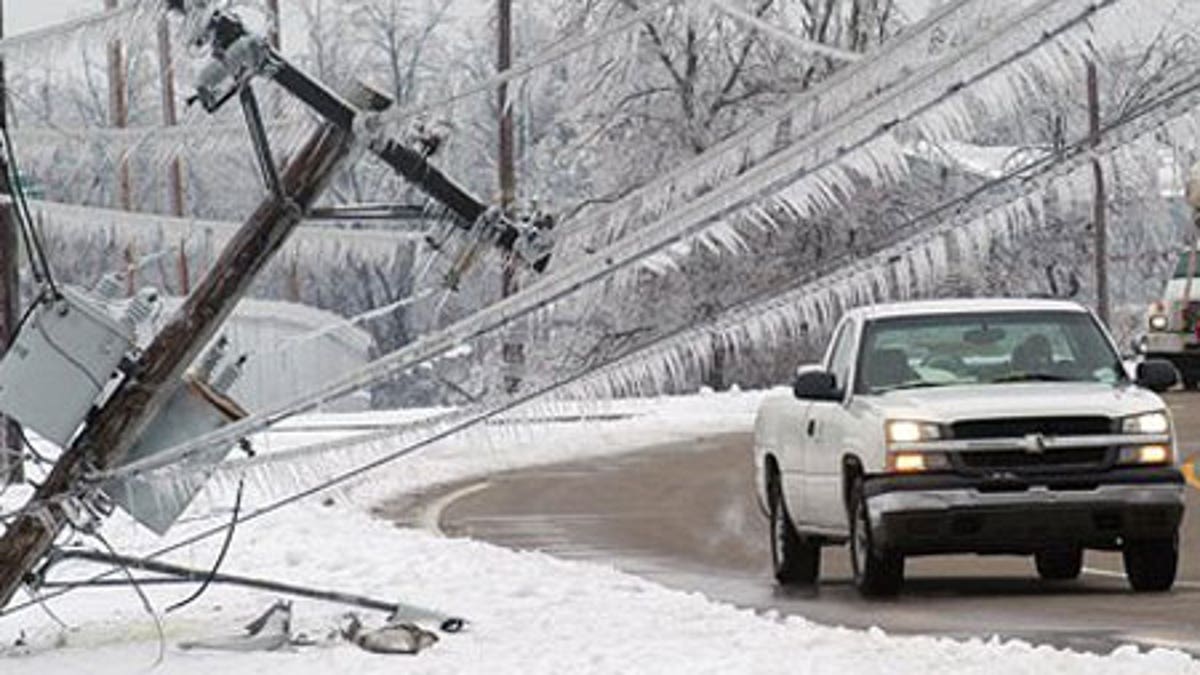
Jan. 31: A vehicle prepares to pass the top of a power pole that fell onto the sidewalk along 3rd Street in Paducah, Ky. (AP)
LITTLE ROCK, Ark. – As Sgt. Michael Franks pulled up to a shack resting among the ice-coated limbs of a forest in northeast Arkansas, he said he couldn't believe that anyone was living on the property located miles from any major road — let alone a 92-year-old woman waiting for something to eat.
But there was Jewel Kitrel, sitting on a tattered couch, warming herself by a wood-burning stove.
Kitrel has lost almost all of her vision, and Franks said he and four other Arkansas National Guardsmen had to explain that they were sent to check on her and bring her food and water after the debris from last week's ice storm made it impossible for her regular nurse to deliver her food.
Click here for photos of the storm.
"She just broke down and started crying," said Franks. "She was so happy that we had come out there, and that we cared enough to come out and see her to make sure she was alright."
It was a happy discovery for Guard troops who have finally started to make their way into the most remote parts of Arkansas and Kentucky a week after a powerful storm swept through.
The storm, blamed or suspected in at least 56 deaths nationwide, has left a trail of grief from the Ozarks to the Appalachians.
At its height, the storm knocked out power to 1.3 million customers from the Southern Plains to the East Coast. As of Tuesday morning, more than 415,000 homes and businesses remained without electricity in Kentucky and Arkansas, the hardest-hit states.
Some died from hypothermia, huddled in their cold, dark homes. Others died in traffic accidents or from carbon monoxide poisoning caused mainly by improperly ventilated propane and kerosene heaters. The door-to-door checks being completed in the days after the storm are an effort to keep the death toll from rising as people wait for the power to return.
The Arkansas Department of Emergency Management was processing requests Monday from local governments for food, water and generators, as crews made their way into the more rural areas and found people who were still unable to leave their homes.
"They were out there checking houses to make sure that no one fell through the cracks or was forgotten about," said Mayor Gerald Morris of Piggott, Ark.
In some cases, it has been too late. Relatives who went Thursday to check on Thomas Lacy in White Plains, Kentucky, found the 84-year-old had died in his mobile home, bundled in a housecoat that couldn't keep him warm after the power went out. He died of hypothermia.
Relatives said Lacy was stubborn when it came to leaving the tiny community where he lived for the past 84 years, even when the severe winter storm bore down with lethal low temperatures.
"He was born and raised on that property and he would not leave," said his niece, Karla Bower of Campbellsville.
Lacy didn't answer the phone the day they found him. At first, relatives thought he'd forgotten his hearing aid and simply couldn't hear the rings. But the ice and the cold made them uneasy.
Bower and her parents made their way to Lacy's home, hoping to persuade him to join them at her home an hour and a half away in Campbellsville. When they arrived, another relative had already gotten there and found Lacy's body.
Even after Guard members found her on Monday, Kitrel refused to leave her home. The servicemen gave her a survival meal and asked her to go with them to a nearby town where she could stay in a shelter.
Kitrel had been living in the tiny building for over two months, after her home burned down. Franks said he thought she had always relied on wood-fired heat at her rural home. So, when the power went out last week, she just stocked up on wood and bundled up the same as any other winter night.
"We tried to get her to come back with us, but she was pretty adamant about not leaving," Franks said as he chuckled slightly recalling the event. "She said she was more comfortable there than she would be anywhere else."
Franks said Guard troops will check on her twice daily to make sure she's OK.
